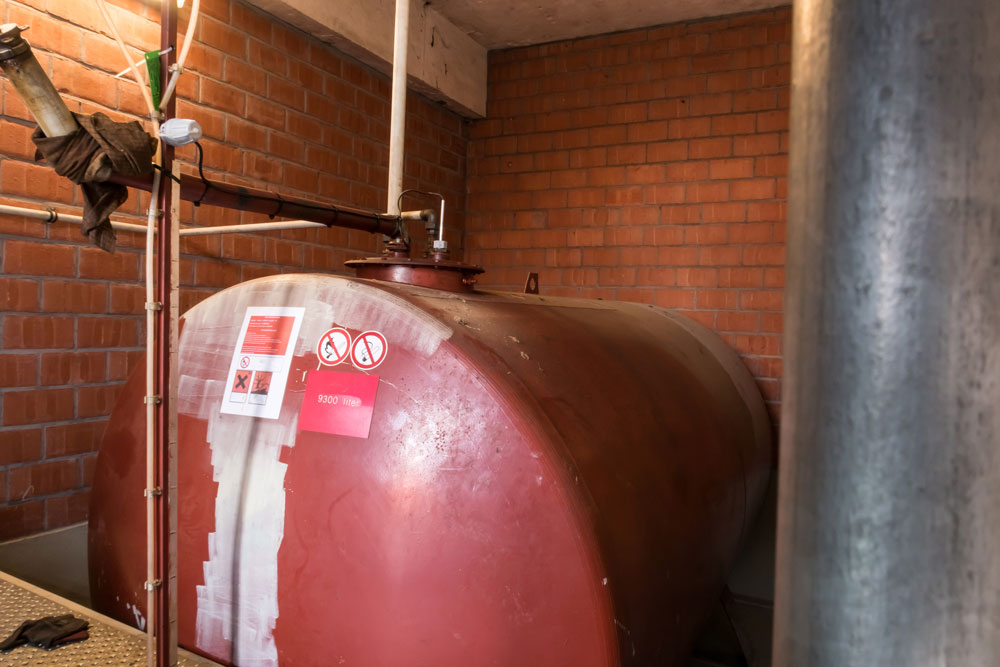What To Do When Oil Spills During A Delivery
 CONTENTS
CONTENTS
- What causes heating oil spills during delivery?
- What are the other causes of kerosene spills?
- What to do when heating oil spills on your property
- How to prevent kerosene spills
- Contact us today
Heating oil spills are often caused by faulty oil tanks, human error, and extreme weather. But sometimes spillages can also happen during the diesel or kerosene fuel deliveries. A quick, effective response is critical to protect people's health and minimise damage to your property as well as the environment.
We have specialist cleaners stationed across the UK who are ready to deal with oil spills on hard surfaces and in the environment. They are available nationwide, 24/7, 365 days a year to provide our oil spill cleaning service, and can be on site within several hours in an emergency.
Read on to learn more about what to do when heating fuel spills during a delivery.
What causes heating oil spills during delivery?
There are problems with the tank
A common cause of heating oil spills stems from issues related to the storage tank itself. Aging tanks are particularly susceptible to corrosion and structural failure which may not be immediately obvious but can lead to significant leaks when filled. Homeowners must make it a habit to scrutinise their tanks meticulously for any indications of deterioration.
In addition, improper installation or maintenance can compromise a tank’s integrity. Ensuring that your tank is installed by qualified professionals and adheres to local regulations is essential in mitigating this risk.
The technicians are unfamiliar with the tank
Your kerosene supplier's technicians might miss critical steps involved with the safe delivery of fuel or fail to notice potential hazards, leading to overfills or equipment mishandling.
To prevent human error from causing spills, homeowners should always partner with trusted providers that offer comprehensive instruction on diverse tank and system configurations.
The tank is overfilled
An overfill occurs when more domestic heating oil is delivered than what the tank can hold, often resulting from inaccurate gauge readings or miscommunication about capacity limits. Accurate measuring equipment must be used and there should be a dialogue between property owners and those in charge of refuelling to ensure the correct amount is delivered.
The delivery vehicle gets in an accident
Even minor collisions can cause hoses or pipes to rupture, leading to home heating oil being spilled. Homeowners should remain aware of their surroundings during scheduled kerosene deliveries to ensure a safe and accessible path for their oil supplier's vehicles to prevent such accidents.
What are the other causes of kerosene spills?
Environmental factors
Kerosene heating oil spills are frequently caused by severe climatic phenomena. For instance, heavy rain or flooding can erode tank foundations or damage pipelines leading to leaks. Similarly, severe cold snaps cause tanks and pipes to contract and potentially crack, resulting in spillages. You must place storage units in areas not prone to flooding.
Equipment failure
Aging infrastructure is a common cause of domestic spills. Tanks corrode over time if not properly maintained, eventually developing leaks that can go unnoticed. Faulty valves or broken gauges may also fail to signal an overflow during the filling process.
Pipeline issues can allow oil to seep into surrounding soil before detection systems trigger alarms, as well. Regular inspections can help mitigate such risks by identifying potential problems early on.
You can learn more about the different causes of oil spills at home here.
What to do when heating oil spills on your property
If you find yourself facing a heating oil spill on your property, it is essential to act swiftly and correctly. If mishandled, heating oil may wreak havoc on the ecosystem and endanger health. The first step is always to bring in professionals for the cleanup process rather than attempting it yourself.
Possessing the specialist tools and professional expertise required to tackle the spill, these specialists ensure the pollutant is eradicated securely without exacerbating damage. If the spill has occurred on land, in soil, or on water, you must then contact the Environment Agency.
Attempting to clean up an oil spill by yourself can put your health at risk and may lead to the oil spreading further or entering the environment if it has not already. The wrong clean up method, such as cleaning the affected area with detergents or washing the oil down the drain can make the situation worse, too.
Professionals will assess the situation, contain the spread of oil, and begin remediation processes that adhere strictly to safety regulations. They can give you peace of mind the spill will be dealt with in the most effective way. You can learn more about cleaning up a kerosene spill in this blog.
While you wait for help to arrive, minimise contact with spilled material as much as possible as prolonged exposure can pose health risks. Ensure pets and children are kept away from affected areas, as well. If possible, ventilate indoor spaces where fumes might have entered.
You then need to get in touch with your insurance company. They will need full details about what happened including estimates from oil spill clean up specialists regarding potential costs involved to process the claim.
How to prevent kerosene spills
One key step in preventing kerosene spills is ensuring that storage tanks are regularly maintained. This includes checking for corrosion or damage which could lead to leaks. Tanks should be inspected once a year by professionals who can spot potential issues before they escalate into bigger problems.
Installing devices to prevent overfilling on tanks is another step taken for safety. These mechanisms automatically shut off the flow when the tank reaches its capacity, significantly reducing the risk of overfills during delivery.
To further mitigate risks associated with tank failure, consider upgrading older single-skinned tanks to double-skinned models which offer an extra layer of protection against leaks.
Business owners that have a heating oil tank at their site of business should also make sure individuals involved in the delivery and handling of heating oil are adequately trained. This training should cover proper filling techniques, emergency response actions if a spill occurs, and routine checks for any signs of leakage around connection points after each delivery.
Contact us today
Our oil spill specialists can clean up a wide range of oils including kerosene, diesel, petrol, and transformer oil. In the event of an environmental spill, we also offer environmental consultancy.
To find out more about our kerosene spill clean up service and our oil spill cleaning service, contact our team today on 0208 066 0360 or email enquiries@icecleaning.co.uk.

Speak with me today,
I’m here to help
By asking you a few questions either via phone or email I can immediately provide a realistic estimation of the cost.

Why choose us?
- Cater to a wide variety of cleaning situations
- Nationwide coverage, available 24/7
- Cater to commercial and domestic clients
- Free survey provided prior to quotation
- Emergency response team
- Offer a bespoke service designed to suit all your needs
- All technicians hold professional health and safety qualifications, including BICSc, IOSH, Dewpoint Professional & Safe Contractor
We’re fully accredited
We place best practise, professional expertise and health and safety at the core of our business. We’re fully compliant with all legal obligations. You can view a list of our accreditations below, or visit our Health & Safety page for more information.











-RGB-small.1707319151.jpg)




















